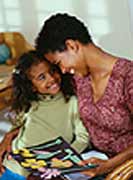
FRIDAY, May 4 (HealthDay News) — An increasing number of college-educated American women in their late 30s and 40s are having children, a new study shows.
The findings may represent a turnaround from previous decades, when the trend was for college-educated women to have fewer children, the researchers noted.
They analyzed long-term national data and found that childlessness among college-educated women peaked in the late 1990s, when about 30 percent had no children. Between 1998 and 2008, the proportion of women in this group who did not have children fell by about 5 percent.
“We may be seeing the beginning of a new trend,” study co-author Bruce Weinberg, an economics professor at Ohio State University, said in a university news release.
“One of the major economic stories of the second half of the 20th century was that highly educated women were working more and having fewer children. It is too early to definitively say that trend is over, but there is no doubt we have seen fertility rise among older, highly educated women,” he noted.
The data do not reveal whether older, highly-educated women are leaving the labor market to have children, or are continuing to work.
The fact that fertility treatments have become more accessible and affordable in recent years may help explain why more women in their late 30s and 40s are having children, the researchers suggested.
However, that’s not the only reason.
“Although our estimates are not exact, it is clear that there was an increase in older women having children even after taking into account the fact that fertility treatments are more accessible and affordable,” Weinberg said. “Fertility treatments contributed, but it isn’t the only factor.”
The study appeared online April 23 in the the Journal of Population Economics.
More information
The U.S. Centers for Disease Control and Prevention offers tips for a healthy pregnancy.

